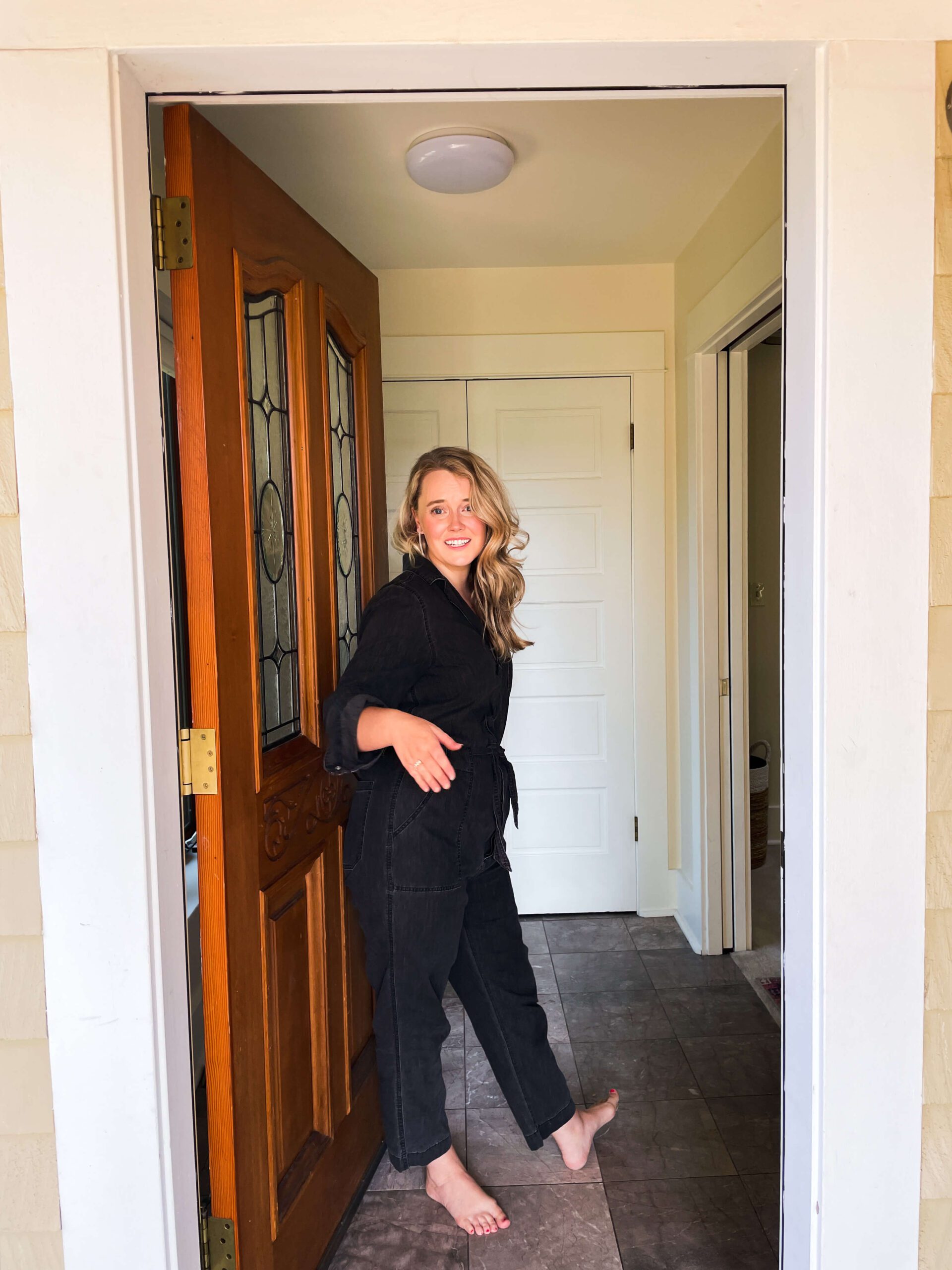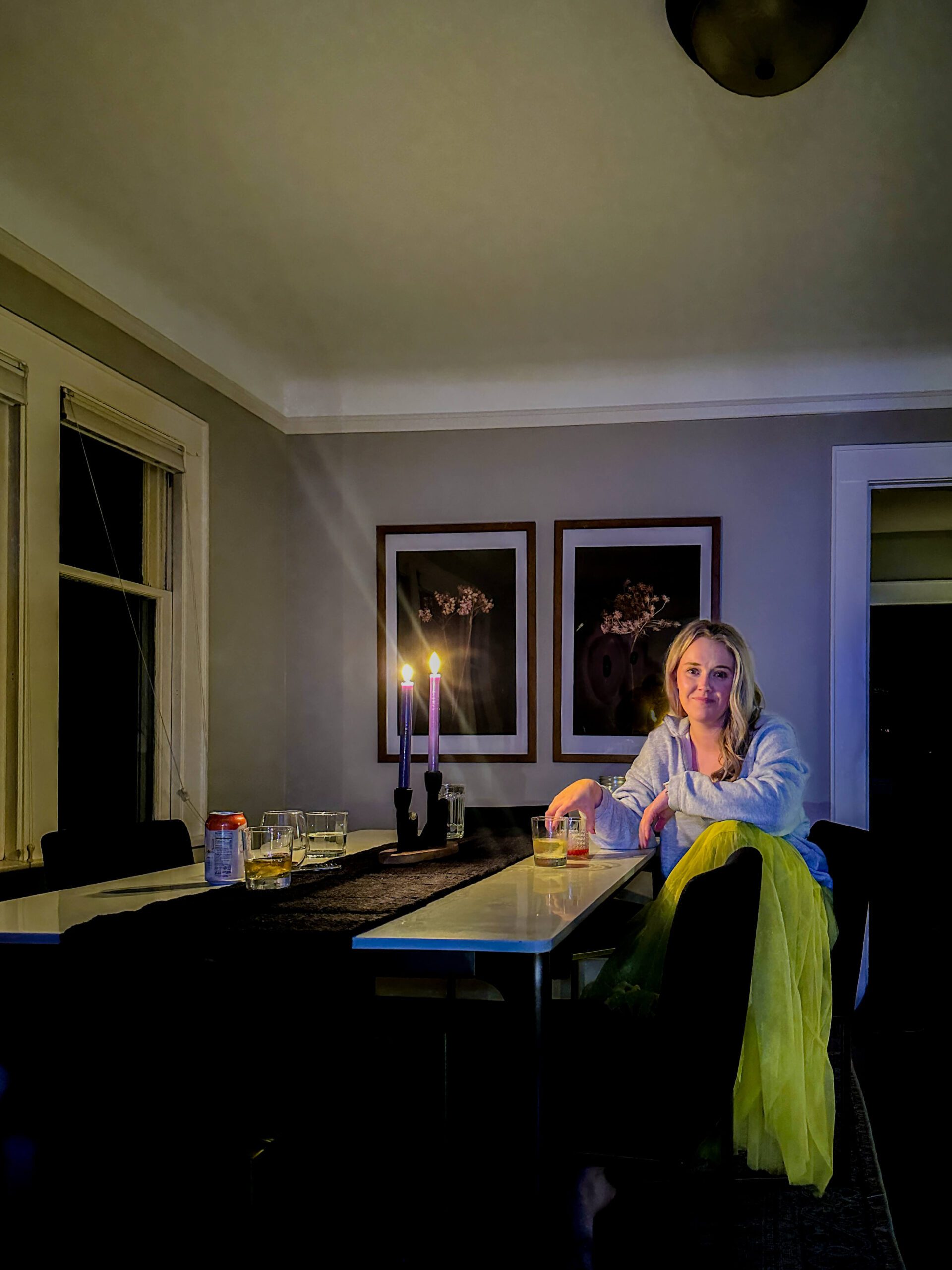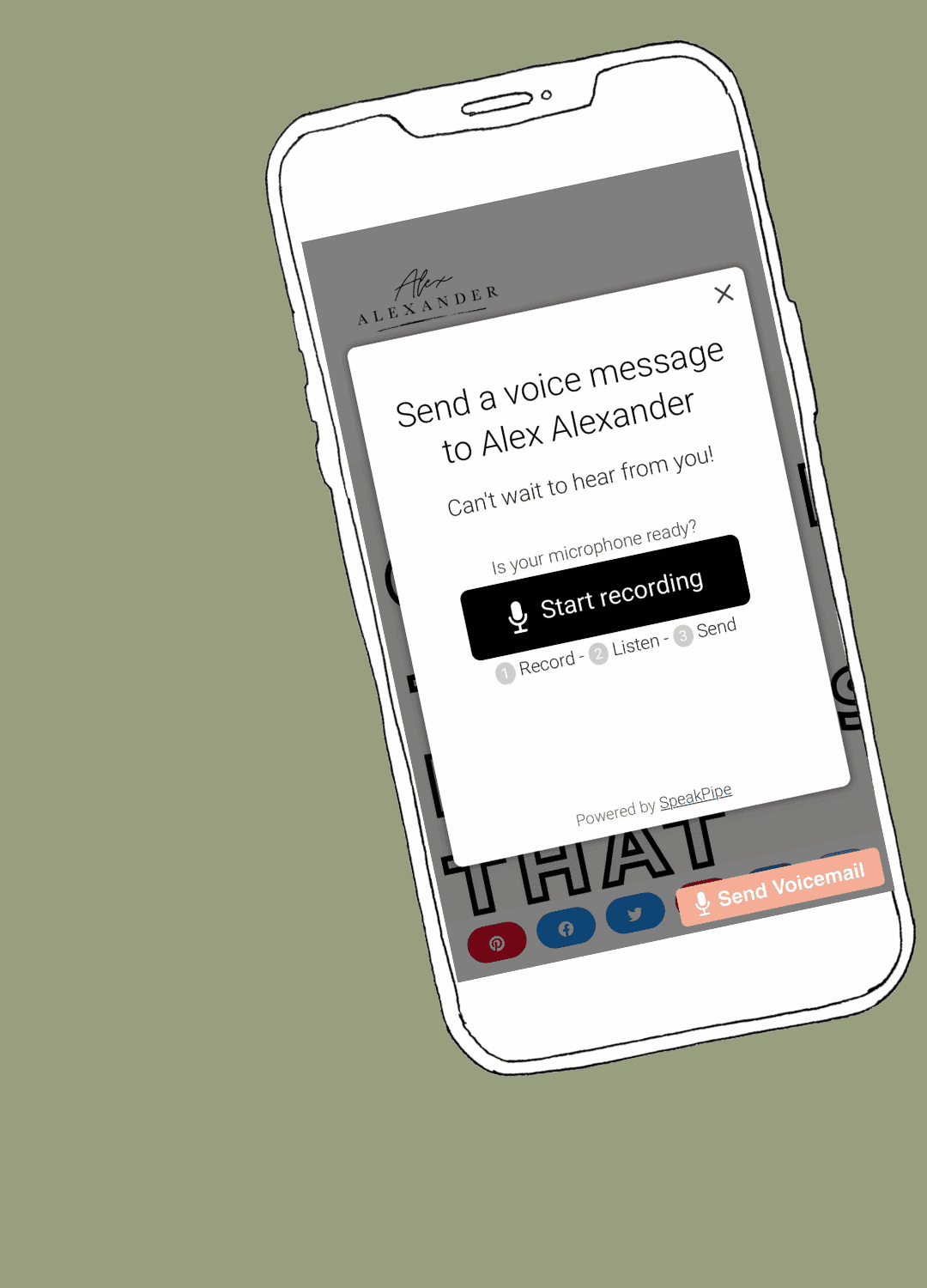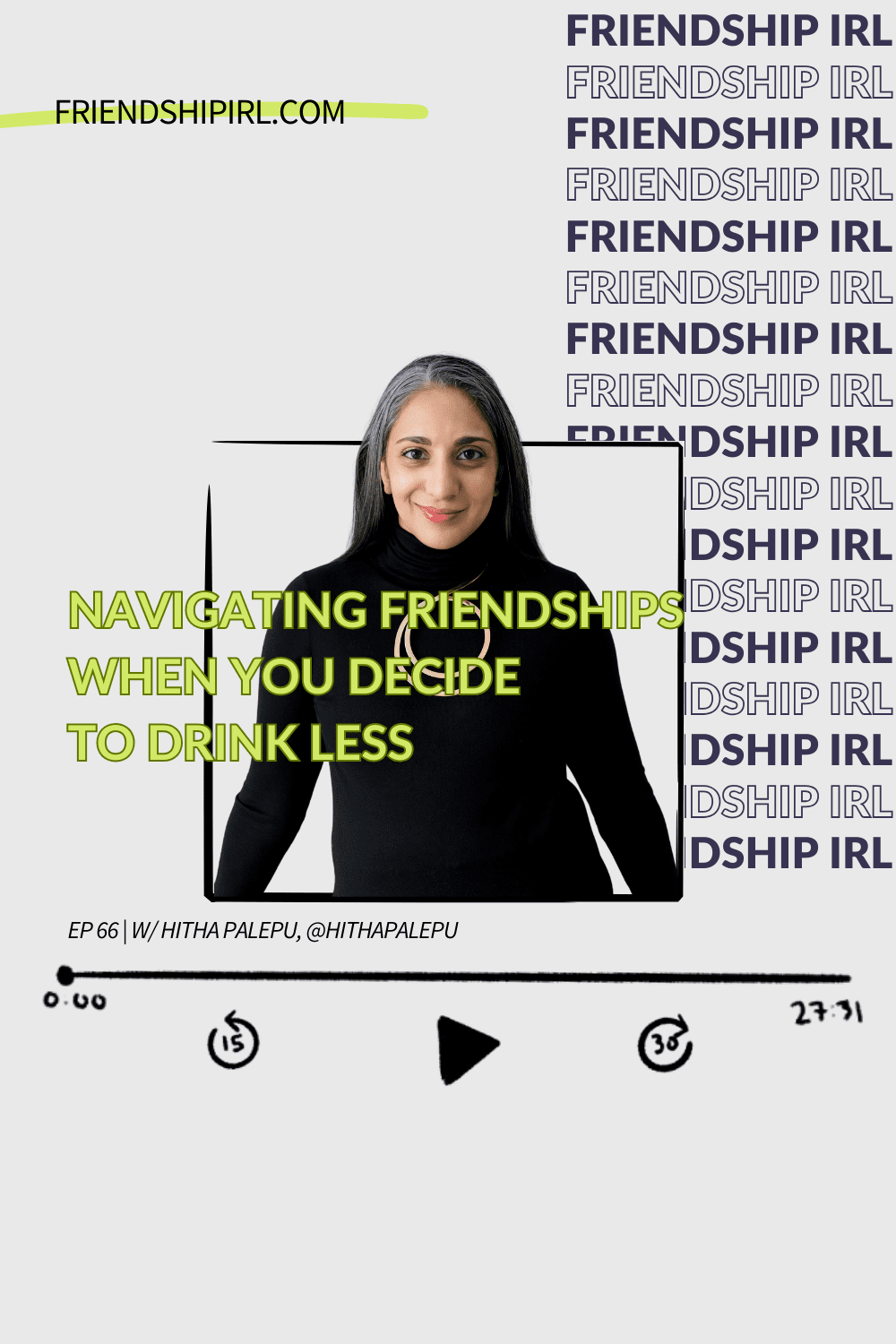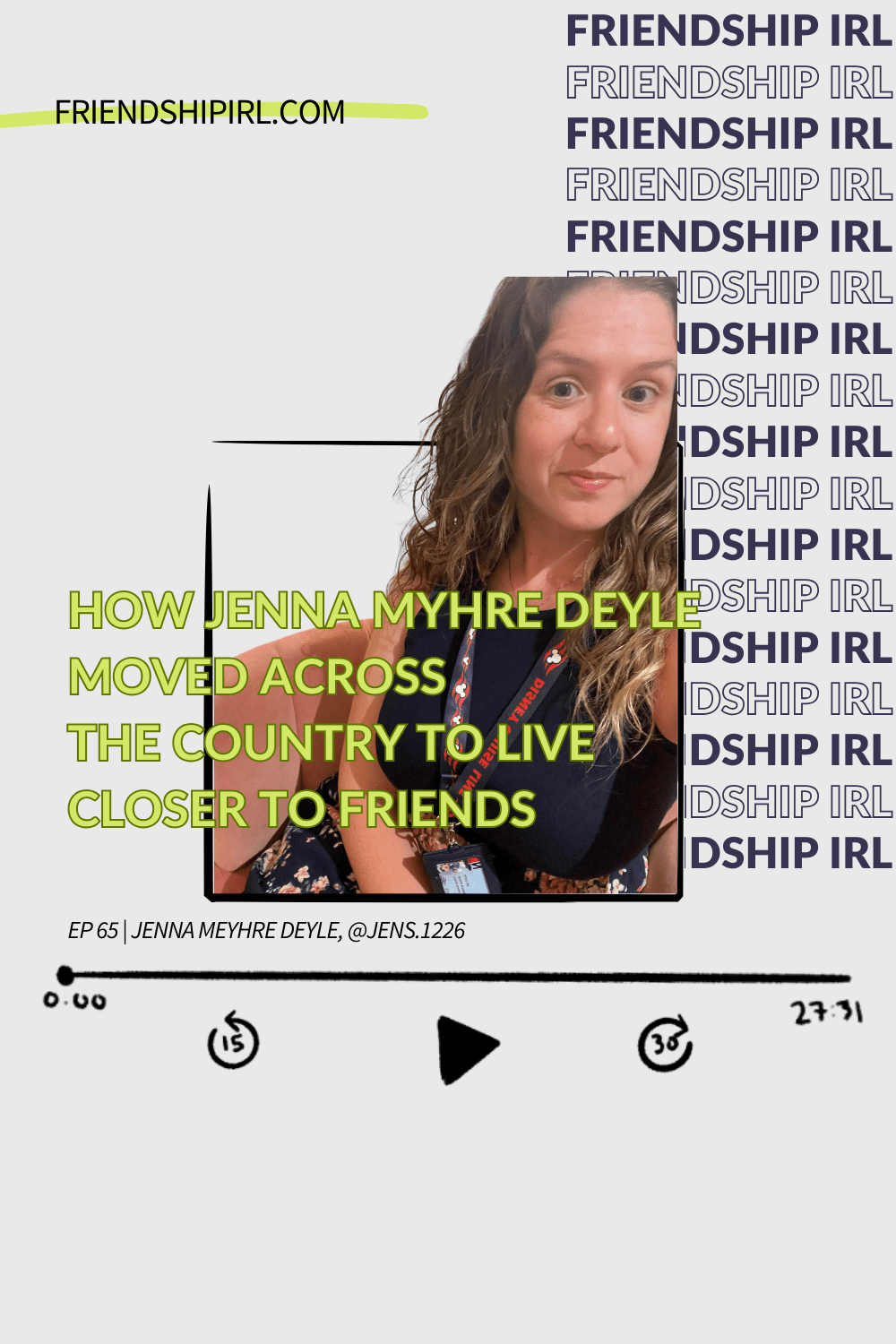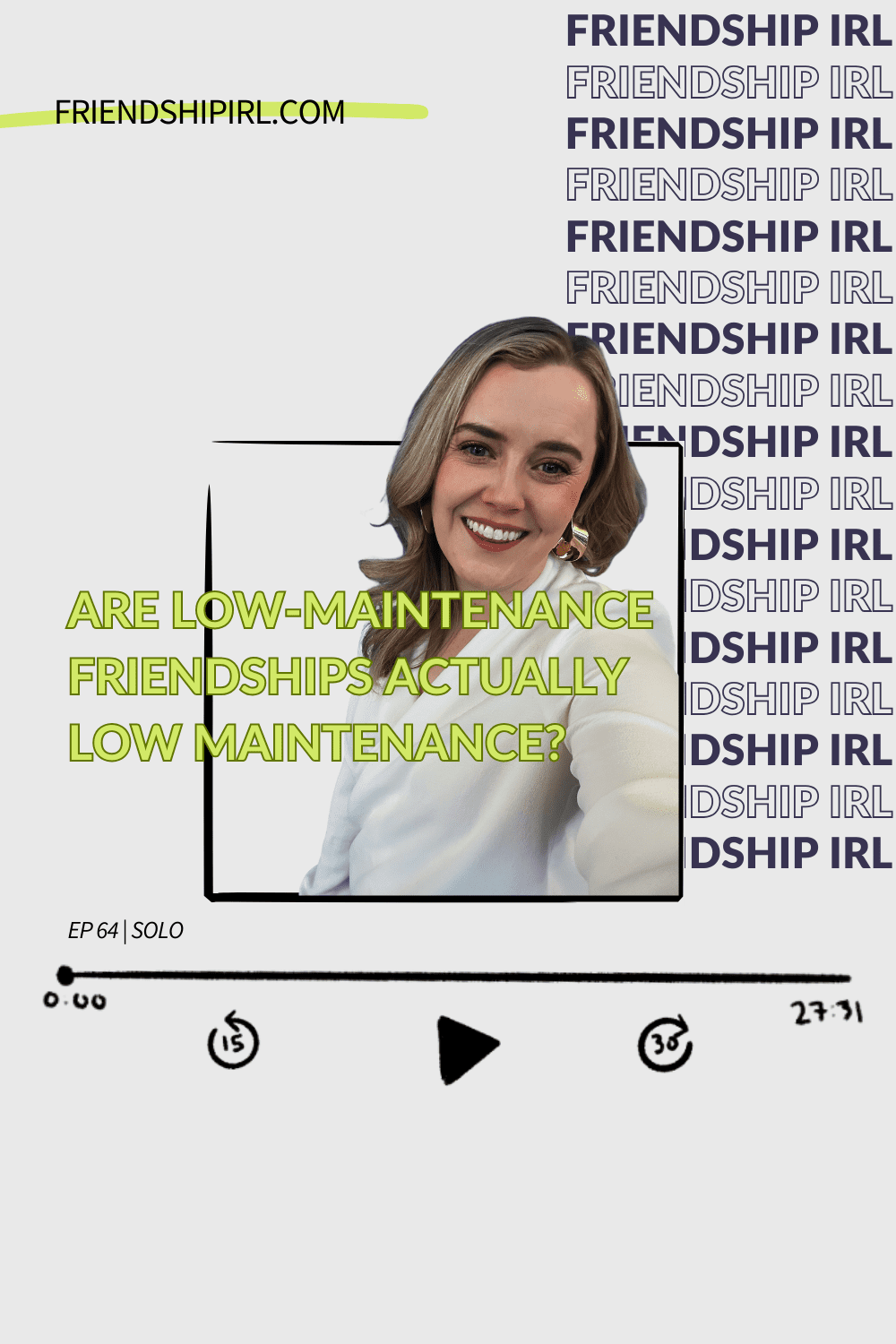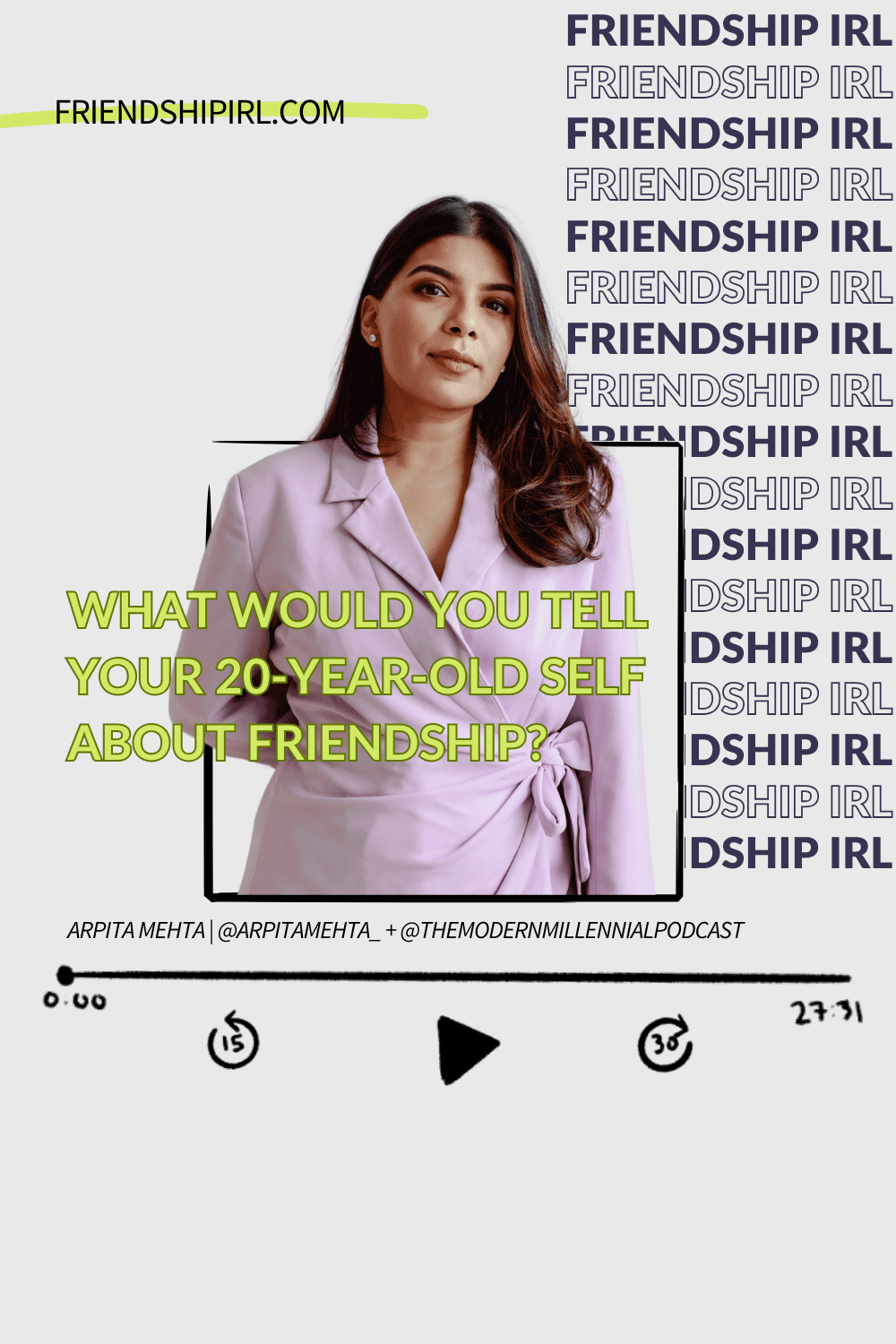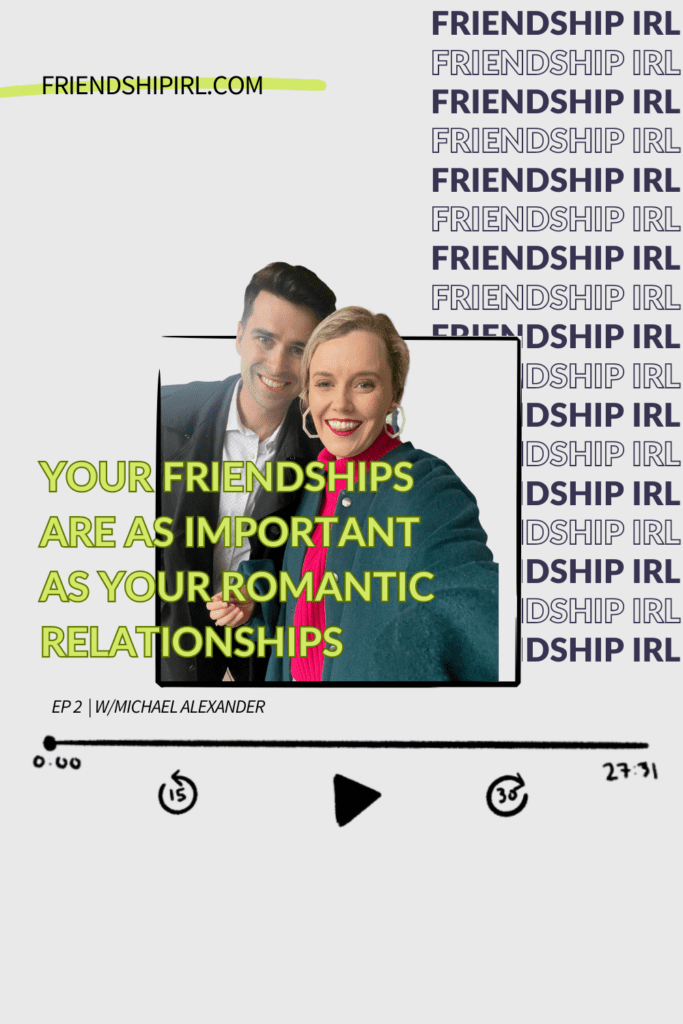
Podcast Description
Today’s guest is my husband Michael. I know, some of you might be wondering: Alex, you just started a friendship podcast. Why are you bringing your romantic partner on?
But here’s the thing. This romantic partnership supports all the relationships we have outside it – with friends, family members, community. All the relationships in our life also help support this romantic partnership. It’s all connected.
So today we want to let you inside how WE look at the interconnectedness of all these relationships – and how prioritizing friendship can actually SUPPORT your marriage.
Michael and I met in college, the prime time for friends. If we had just forgotten everybody else at that time in our lives, we wouldn’t have any friends. We had to learn early how to balance our romantic relationship with our friendships.
In this episode you’ll hear:
- The importance of seeking a variety of support outside marriages/relationships – particularly with people who aren’t immediately affected by big life transitions
- How it’s unfair to burden one person (our partners) to support all parts of us; it works best when we have different friends to support our variety of “buckets”
- How to call out and say, “I am not the right person for this” – for example, I am not the right person for Michael to go to about anything regarding football!
- The importance of having separate friendships with your friends, even if you’re in a couple
- The incredible dynamics it takes to have “couple friends”
- Yes, other friendships cuts time with your significant other – but it can make you come back together energized, with fresh perspectives and appreciation for each other
Reflection Question:
How do you and your partner support each other’s friendships?
Notable Quotes from Alex
“I cannot expect him to hold and support all the parts of me, because he doesn’t share all the same interests. He doesn’t have all the same life experiences. He doesn’t move through this world as a woman, so he can’t understand certain things. No other person can understand and hold all the parts of us. And I feel like sometimes, that’s what marriage expectations are – is that we marry this person, and then they become our person. And they’re supposed to know how to be there for us in all the ways all the time, and that feels like an unfair burden.”
“One of the most common objections I hear when I give our take on a romantic partnership and friendships is the sharing of time. The loss of time with your significant other. There’s no way around it. The honest truth is, yes, it cuts into your time. But the way I like to think about it is, when we do come back together, we come back with fresh perspectives. We come back reenergized because we spent our time doing something we love. And it also honestly creates a little scarcity. It makes us appreciate the time we do have together.”
Resources & Links
Like what you hear? Visit my website, leave me a voicemail, and follow me on Instagram!
Leave Alex a voicemail!
Related to Friendship Important as Romantic Relationships
Can I add you to the group chat?
Don't miss an update - Sign up for our weekly newsletter.
Until next time…
Take the conversation beyond the new podcast on friendship! Follow Alex on Instagram (@itsalexalexander) or Tiktok (@itsalexalexander), or send her a voice message directly with all your friendship thoughts, problems, and triumphs by heading to AlexAlex.chat and hitting record.
Episode Transcript
Podcast Intro 00:00
Alrighty, gang. Here’s to nights that turn into mornings and friends that turn in family! Cheers! Hello, hello and welcome to the Friendship IRL podcast. I’m your host, Alex Alexander. My friends, they would tell you, “I like to ask the hard questions.” You know who I am in the group? I’m the person that’s saying, “Okay, I’m gonna ask this question, but don’t feel like you have to answer it.”And now, I can be that friend for you too.
Alex Alexander [Narration] 00:50
Today’s episode, I invite my husband, Michael, onto the podcast. And you might be wondering, “Alex, you just started a friendship podcast! Why are you bringing on your romantic partner?” Well, here’s the thing – in a world, that prioritizes romantic partnership, we (Michael and myself) see all the relationships in our life as support for this romantic partnership AND this romantic partnership as support for all the relationships that surround us – friendships, family, community. It’s all connected. So today, we want to let you inside how we look at the interconnectedness of all of these relationships and how prioritizing friendship can actually support your marriage.
Alex Alexander 01:38
Hi!
Michael Alexander 01:39
Hey there.
Alex Alexander 01:41
How you doing?
Michael Alexander 01:42
I’m good. How are you?
Alex Alexander 01:44
I’m good. How are you feeling about your first podcast recording?
Michael Alexander 01:48
A little nervous. But we have some good things to talk about.
Alex Alexander [Narration] 01:53
When I went down this road, did you know I was going to drag you in to the podcast?
Michael Alexander 02:00
Absolutely.
Alex Alexander [Narration] 02:01
Really? Yeah.
Michael Alexander 02:04
We’ve been down this friendship community thing together? Well, since we’ve known each other. For the last 13 years or so.
Alex Alexander [Narration] 02:12
13 years…
Alex Alexander 02:14
So for a little backstory – we met when we were 20 and I probably have to go take some photos out of the archives when I say that. We met in college – so prime time for friends and I actually think that’s something that makes our marriage and the balance of friendships. rather interesting. If we had just forgotten everybody else, at the time in life when everybody is spending all their time with their friends we wouldn’t have had any friends. I think we had to figure out how to balance our romantic relationship with all of our friendships.
Alex Alexander [Narration] 02:55
You wouldn’t believe me if I told you this, but Michael is actually a talker. Michael, I think, might be more extroverted than I am and that’s hard to do. But you’ll come to find, I spend endless hours thinking about our friendships. So it’s no shock that he’s just agreeing with me here. We’ve had this conversation many a time. In college, everything is about your friends. You live with your friends. You wake up and text them. You ask them what they’re doing for breakfast, lunch, dinner, classes, errands. You are living life with your friends. When Michael and I met junior year of college, it was no different. We both had thriving groups of friends. And we really didn’t want to lose that. I don’t know if it was just because we met halfway through junior year or what. But I think we knew that the amount of time we had left — seeing our friends this way every day – well, the days were numbered. So we kept going. We kept going with the friendships. We didn’t change anything. And that’s kind of how we’ve prioritized it. Our entire relationship.
Michael Alexander 04:15
Agreed.
Alex Alexander 04:19
That’s all you have to say on that?
Michael Alexander 04:20
I mean, it’s well put. I certainly came from a family and grew up where friends were important to me and my earlier years in college, you know, that continued to be the case. I had roommates and other friends that I just knew I was going to be close with. I wanted the person that I was going to end up with to *knock on wood* be friends with them and fortunate enough, that was the case for both of us. But certainly you have to make it a priority, which you may not even realize when you’re 20 — just going through know what it is to be 20 and in college.
Alex Alexander [Narration] 05:03
Do you think when we were 20 that we balanced our friendships and our relationship? Well, do you think we did a good job?
Michael Alexander 05:09
Honestly, it’s probably a similar to how we do it now. It just comes naturally. And I, you know, I’ve used the word already, but we do prioritize it, whether it’s extrinsically, or intrinsically, we just do it. We always have. So just by nature of us being together, getting to know each other, certainly. But our friends, as well, that just fortunately for us “clicked.”
Alex Alexander [Narration] 05:39
So, you and I have talked about this a number of times. It’s not a new conversation — but in a world, that prioritizes romantic relationships above all else I don’t know if I’d say that we see it that way.
Alex Alexander 05:56
I think that we believe that the other relationships support our marriage, and our marriage supports those other relationships. And it’s all like symbiotic and connected. I don’t really know how we’ve done that. But I think we have, you know? We encourage each other to have other friends depend on other people. That’s like a constant thing that we’ve done. Do you agree?
Michael Alexander 06:19
Yeah. Thank you use the word burden. What we learned, or just happenstance, really dove into was understanding ‘what each other could provide to the other’ and ‘what we needed to find elsewhere.’ In our existing friendships, or the new friendships we were developing as we were starting to build our romantic relationship, which obviously turned into marriage. But we both understood, which, yes, may be the opposite of what society tells you is, ‘it’s too much of a burden to put on one person to do that.’
Alex Alexander [Narration] 07:04
If you are confused, because you have not heard the word burden. Just know, I was also confused when we recorded this, but the more think about it, I think Michael is just referring to how — in our everyday life, when we are not recording this podcast, I talk about how unfair it is to burden one person. How I cannot expect him to ‘hold and support all the parts of me’ because he doesn’t share all the same interests. He doesn’t have all the same life experiences. I mean, honestly, he doesn’t move through this world as a woman so he can only understand certain things. No other person can understand and hold all the parts of us. And I feel like, sometimes, that’s what marriage expectations are. That we marry this person. They become our person. And they’re supposed to know how to be there for us in ‘all the ways.’ ‘All the time.’ And (to me) that feels like an unfair burden.
PODCAST EPISODE! Listen to the Three Types of Roots here.
Michael Alexander 08:08
We’ve made it in terms of relying on other people to fill whatever bucket we need to and, certainly, you have more buckets than anyone else in my life. But you definitely don’t have all of them.
Alex Alexander 08:25
Like fantasy football? I don’t know I don’t have the fantasy football bucket? BABE?! I don’t have the sports bucket? I don’t have all your interests?!
Michael Alexander 08:34
Episode Eight fantasy football talk.
Alex Alexander [Narration] 08:37
Already scheduled in? Okay, we’ll determine what episode number that is. But yeah, I do want to bring your fantasy football guys — the guys on and talk about those friendships.
Alex Alexander 08:46
But when you were just talking, I was thinking about how it’s not even one person in a bucket. You know, one area of support in your life isn’t just me. It’s a variety of people in a variety of ways. Whether you go to me or not, or whether I’m not even in that bucket — like I’m not even in the fantasy football bucket. Or I’m at the bottom — I’m like the smallest sliver. Whatever. It’s not just one person. We each have a variety of people, I think in each bucket.
Michael Alexander 09:20
Agreed, yeah. And that can be friends. It can be family. It can be coworkers. It really runs the gamut as long as you understand, or at least I think it’s important to understand, that what you need in your life you can rely on others to provide that. If you’re blunt and frank with those individuals, then they can provide the support that you’re looking for and whatever that area is. Like you said, it definitely is not one person. It can be a multitude of people for whatever you’re really looking for.
Alex Alexander [Narration] 09:58
One of the MOST COMMON OBJECTIONS I hear, when I give our take on a romantic partnership and friendships is the “sharing of time.” The loss of time with your significant other. There’s no way around it. The honest truth is – YES – it cuts into your time. But the way I like to think about it is, when we do come back together we come back with fresh perspectives. We come back re-energized because we spent our time doing something we love. And it also honestly creates a little scarcity; it makes us appreciate the time we do have together and spend it in more intentional ways versus feeling like our time is endless. But there is some frustration sometimes. There’s some struggle with, maybe having to change plans or cancel plans. With having to juggle the fact that like a friend calls and wants to talk or wants to go do something — and that’s a limited opportunity. Schedule, schedules align. Knowing and appreciating that those times don’t come as often as the daily interactions that Michael and I have, in our day-to-day life.
Alex Alexander 11:28
You needed support and we were supposed to do something — sometimes we have to cancel on each other. Sometimes we have to choose, you know me saying to you like, “yeah, you go hang out with him” or “you go, you know, go out and talk to him he sounds like he’s having a rough night.” I don’t know how we do that. Do you think we know that sometimes other people need us more than we need each other? What are some other examples of ways that we encourage each other to go out and depend on other people?
Michael Alexander 11:59
Like you said, it’s, if you’re having a bad day or I think ,certainly, it’s you and I don’t have all similar interests. In terms of our hobbies, or what generically we enjoy — I love sports, you call it sports ball. So I’m obviously not going to be going to you if I want to just sit down and watch a football game, I have other people to do that. And I think it’s even outside of activities. It’s also important things that are happening in your life. So I still have a lot of close people in my life where I started my career with them, and although we went different paths, I’m able to go to them. When talking about my career, certainly, we have those conversations, but I can go and I do go to them to talk about what’s going on for me. Hear about what’s going on for them. And get advice and just have a dialogue because they are closer to KNOWING, I suppose what I do, as opposed to you just HEAR IT on a regular basis, just by nature of us being together all the time.
Alex Alexander [Narration] 13:09
Definitely. My focus is on you and your career, but also how it impacts our life.
Alex Alexander 13:15
So I mean — I’m not impartial. My feelings and beliefs, have a film over them of ‘what I care about,’ You going to another friend might be a better choice for you, because they’re not going to have those same filters. They’re not going to push you because it doesn’t affect them on the day-to-day the way it does me.
Alex Alexander [Narration] 13:36
I think about something often the people that are closest to us are the ones that are going to have the hardest time when life transitions happen. Let me explain. If you have a fitness goal, and you have tried to achieve this fitness goal MANY times and you come to your partner. To your best friend. To your family. — who have watched all the previous attempts, and you tell them you are going for it. The past evidence that they have seen. What they have witnessed is that you haven’t committed. You haven’t done it, right? You’re still trying to do it. This is like take 17. And that can be so hard. Because you want your closest people to support you — and they might! They might say, “you’ve got at this time!” and they truly want you to, but in the back of their mind, you can tell that they’re thinking, like…. they have questions. That’s kind of what I’m trying to get at here. It’s a similar situation. In romantic partnership when big shifts are happening. — When big decisions. When career things — those trickled back into our house. So I am not impartial, because, yes, I want what is right for my partner, but simultaneously, I also want maybe– What makes my life comfortable. What makes my life easy. What I see our goals as — and I think we forget that sometimes. I think that we forget that ‘the decisions we are all making trickle out to those around us.’ And that sometimes talking to someone else, that is not affected by your decisions or your goals, could be the right support for you to achieve those things — because they don’t have your history. If you tell someone you are going to go after that fitness goal, and you’ve just met them — What do they have? Besides saying, ” YEAH YOU ARE!” “You are going to do it!” “I believe in you!” They have nothing in their way to show them that they shouldn’t believe you can do it. I know that’s hard to consider going out there and telling these big scary goals to someone you don’t know, but maybe just consider that sometimes the people closest to us ‘do want the best for us,’ but aren’t the people to be part of the messy process… fully.
PODCAST EPISODE! Let’s talk about taking control of your social wellness here.
Alex Alexander 16:34
They have different knowledge. They get it. They’ve been in the office. Things like that.
Michael Alexander 16:38
Yeah. And the hope is, anyone that’s close in our lives is going to have bias towards us – and your married significant other, partner, or what have you is probably going to be more biased than anyone else towards you — so sometimes it’s even nice to, if you have that trusting relationship, you know – career family, romantic relationship, whoever you go to — if you have already set a precedent of giving unbiased real opinions, that’s… in my estimation really valuable. Because you’re getting someone’s real thoughts in whatever’s going on in your life, the questions that you have, and that particular topic.
Alex Alexander [Narration] 17:23
Well and you get a variety of perspectives, too.
Alex Alexander 17:26
Ultimately, you’re the one that’s going to have to make the decision, you’re just going to other people for their perspective or their experience. So that variety is helpful, too.
Michael Alexander 17:37
To that point — the variety is helpful, because it will likely bring up something that you never thought of. It happens for me, certainly all the time, I know it does for you, in terms, of “I have this conversation, and a light bulb came on, and I wasn’t even thinking about it from this lens or this angle, or what have you.” So getting that variety of opinions is great, because everyone is having different experiences every day. So, if it’s a career thing — someone can draw on what they’ve been doing the last five years after we broke off from working together. Family — obviously family, it’s a fully loaded term, but you know, we all have different familial things going on and having that those people that talk to you about those — helps me certainly live a fuller life we’ll say that.
Alex Alexander [Narration] 18:32
I feel like we’ve all heard some variation of this quote/ this advice that says, “You know, don’t listen to somebody who isn’t where you want to be” “Who’s maybe like a step or two ahead of you” When I think about this variety piece with friends — what I think about is — sometimes, people go to their parents, for example, for advice on everything. For finances. For home purchases. For what we should do. And we live in a different time than our parents did. The world, the economy…. things do not work the same way. What was good advice decades ago is not good advice now. Michael, and I agree. We’ve talked about this. We’ve talked with so many friends about this that a huge piece of ‘our strength as a couple’ is the fact that we share actively with our friends — our career choices, our finance questions, ‘Who’s done research on this?’ ‘Who’s experienced this?’ ‘Who’s gone after this thing that they want?’ ‘How have you done it… today… in this day and age?’ Other people around us — wiser, smarter people (parents) may not have to be going through it with the same… I want to say restrictions, but like the same scenarios? The same scenarios. And that’s really what we’re getting at here. We think part of our strength as a couple is that we are openly crowdsourcing with our friends. ‘What they’re doing to achieve their goals.’ ‘Get the job.’ ‘Make the money.’ ‘Invest it.’ ‘How are they making decisions about family or friends or moves?’ ‘Travel.’ ‘Where they’re spending their time and their energy.’ ‘Who they’re connecting with.’ Because they’re doing the same thing we are… and sharing tha, and crowdsourcing that information is helping us as a couple. We’re not stuck with just our two brains. We’ve got DOZENS of brains who are considering the same things we are.
Alex Alexander 21:00
You know, the interesting thing when we’re talking about variety is you go out and you get that advice on some career issue. You get other people’s perspectives, especially people who work in the same industry or something, and then you bring that back into our marriage. So we could…. volley the issue back and forth between the two of us and spin with the same perspectives, but if you go out and get other opinions, then you’re bringing those into YOUR choices, which is impacting OUR life and OUR marriage, and maybe giving me perspectives I hadn’t heard of before. You know, that’s forcing us to grow and change and think of things differently. So the variety isn’t just helping you. It’s also helping us.
Michael Alexander 21:47
Yeah, it’s a good thought process and angle — and us, certainly in our relationship, but for our friends — I know, it’s nice to be sought after for whatever purpose. So also, for my friendship, if I’m asking for advice AND I’m taking it, I’m listening. You know, it’s obviously a two way street, but I think that only strengthens your friendships, your familial ties, what have you, if you have that dialogue back and forth. So everyone’s coming out ahead.
Alex Alexander [Narration] 22:24
Yeah — just more information. More perspectives.
Alex Alexander 22:27
When we gotta all take what feels right to us, but maybe something will appear that you haven’t considered. So what are some ways – like real life examples -What are some things you think you encourage me to seek support in outside of our marriage?
Michael Alexander 22:45
Hmmm. It’s an interesting question, because there’s really nothing, or very few times we tell the other person ‘go do this or that,’ because it’s just naturally what we’ve done.
Alex Alexander [Narration] 23:01
Michael says that we’ve just “always naturally done this.” I think that’s a marker of how long we’ve been together, because “I don’t think we’ve always naturally done this.” I think a lot about this idea of like, FRIENDSHIP CULTURE. What is your friend group culture? And I think there is also a culture in a romantic relationship and in our marriage. Over the years, we have called each other out. We have said, “I don’t think I’m the right person for this.” Or, I mean, I know I’ve used the sports example. I beat it to death in this episode. But…. funny enough, when we started dating, I used to watch football. It’s the only time I’ve ever watched football, those like, first couple years we dated. And I used to be on a fantasy football team. Which is hilarious to think about!! I would try. I would try to really love this interest for Michael. But the truth is; I don’t. I DON’T LOVE IT. I think I started to call that out and say, “You know, I’d rather you go watch the game with friends and I can go do what I want to do. Then when you come home and I come home, we will spend quality time together. We won’t be burned out. Maybe I won’t be burnt out on trying to keep up with you and football today.” I think we do this in our friend groups too. But that that’s honestly probably a different episode. All I would say, is start paying attention to the little things that are building up over time (and don’t feel right) and how you can shift them, because I really do think you can create this environment in any romantic relationship.
Michael Alexander 24:53
Where it’s “Oh, I’m gonna go on a walk with T.” “I’m going to go to a movie with A.” We have a very clear understanding of who we go to for the needs in that particular area, and a lot of the times — it’s just a dialogue. It’s a happy hour. It’s a weekend getaway. Whatever it is. — We never asked, “Why are you doing that?” You’re choosing to do that and not spending time with me. That has never been brought up for us, because we understand that importance. I think it’s not ‘me continuing to tell you to do that’, as much as it’s….
Alex Alexander [Narration] 25:37
‘Us just feeling free to do it, because we’ve seen over time how positive it is, for us individually and us together.’
Michael Alexander 25:47
That’s right. It’s just again… natural. We’ve had years of doing this, and frankly, are the people we are now in formative years in our early 20s. So it, likely, is really hard work for that to happen and we may have just been really lucky. It’s not to say everything’s been hunky dory, in terms of, “Oh, she’s going out to see this person… again. Be great just to hang out tonight.” But the benefits, obviously, were understood and here we are now.
Alex Alexander 26:26
Yeah, I mean, there are definitely nights where you choose to do something, and maybe I am inited, or I’m not invited. I don’t want to do that thing. I mean, movie group is a great example. Sometimes I’m sad, that you’re going to see our friends and go to a movie, but I don’t really want to sit through the movie. However, I know you enjoy the movie. You love seeing them. I could go… Sometimes there are times I wish, ” Yeah. You wouldn’t go to the movie, and we could hang out and do something.” I mean, I definitely think after ‘so many times of that’, you know, at certain point, I’ll say, “I really wish we would go do something. Then we plan it and we do it.” But that’s not to say there aren’t times where one of us is sad.
Michael Alexander 27:14
Yeah,I would imagine there would be a conversation if I went on 17 happy hours in a row after work. You would probably question me likely, and we would at least have a discussion. In terms of the benefits of doing that (having 17 happy hours in a row). And conversely, the benefits of spending time with you. Likely that conversation would be like, “Oh, yeah.. light bulb… I probably shouldn’t make it 18 in a row.” Again, it’s having a trustworthy, open dialogue with ‘your needs’, and ‘what’s important to you’ and who you go to for that. We go to each other for A LOT of things. We do that.
Alex Alexander 28:03
We do… but sometimes we go to somebody else, and then kind of come report to the other person later. You know, sometimes, there’s maybe news that is better for you to share with a work friend first. Sometimes I just think we’re not always the first person we go to. You go to someone else. Or I go to someone else. Then we come back and like tell each other later.
28:27
I would say career wise, I know, I’ve probably gone to — whether it’s current co workers, or those former co workers who are continuing to be my friends — just by nature of having a running dialogue with them about that topic.
Alex Alexander 28:43
I think career is probably… Yeah, a big one for me, too. Sometimes I will go to somebody else that understands, you know, opening their own business. Creating media content. — I will go to somebody else with my “I DID IT.” Just because you aren’t always going to understand the intricacies of how big of a deal it is that I did this tiny, itty, bitty, little thing and like how hard it was. Just because you don’t do this. Somebody else understands the steps it took to do that thing more than you do. So, when I tell you, ‘you’re excited for me, because I’m excited,’ but you don’t understand what it really took.
29:23
For you… that’s the biggest case-in-point, because our lines of work are completely different and you are just starting out on this venture.
Michael Alexander 29:35
So it’s not even as if, for instance, “I’ve been around this for the last 12- 13 years” like you have for me and over a decade of hearing what I’m doing. So yeah, career is, FOR SURE, and I definitely tell you ‘to go do that’ because it’s a lot better than me telling you, ‘I have no idea what you’re talking about.’
Alex Alexander 30:00
Yeah… but I mean, this is a big thing for me right now. This is a BIG venture I’m on. And what you’re saying is this like BIG LIFE PIVOT I’m making — while you are supportive — you don’t understand every detail in there. Even though this is like one of the BIGGEST TRANSITIONS I’ve ever taken — You’re telling me to go celebrate it with other people? Like, that’s okay?!
30:21
THAT IS OK. RECOMMENDED. SUGGESTED. All the words.
Alex Alexander 30:27
Okay. So one other topic that keeps coming to my mind for today is; something else I feel like we’ve really prioritized — Separate friendships with our friends. So even if, as a couple, we hang out with a friend or a different couple all the time. You have your own friendship with that person, and I have my own friendship with that person. Even if that person is like one of ‘my closest friends,’ that doesn’t mean ‘they’re one of your closest friends’ and vice versa.
Alex Alexander [Narration] 31:01
You might be saying, “Well, duh, Alex. Of course, if it’s one of your closest female friends, or your oldest guy friends you’re going to be closer, but I am pointing this out because people that end up in romantic partnership — I hear from them so often — “Well, I just want COUPLE FRIENDS.” “I am now a couple, I want couple friends. ” And this just seems… like it’s not a complete thought, to me. That is great — that you want a ‘couple friends that you can go do things with,’ but having couple friends actually requires MORE dynamics. So, let’s dive in to that a little bit, because my recommendation to people in new romantic partnership is ‘go meet the friends you want to meet.’ If you are part of a couple. Or they are part of a couple, then over time, bring the other people in. See if it is enjoyable. Because if you are now a couple and you want to meet couple friends, you are depending on multiple dynamics working. The likelihood that this is not going to go over well… that two of the people ‘aren’t going to enjoy each other,’ ‘that your significant others are not going to get along.’ It’s very possible! It’s very possible. But that doesn’t mean you shouldn’t enjoy the person you wanted to spend time with. So, let’s talk a little bit about the multitude of dynamics it takes to have couple friends and what that really looks like.
Michael Alexander 32:53
Yeah, we have a number of people like that, and it just might be… Again, going back to who you go to, ‘to fill whatever buckets’ and if you just think of your hierarchy and life. Wherever career or family or wherever that falls — you might just be talking and having dialogue with one person more than the other. It all goes back to that (the buckets), in terms of YES, we have our singular solo relationships with these people. *Hopefully they have the feel that with us.* Those friendships, that community — and can go to us for whatever that (bucket) is for them. But I think that’s what we have harbored and in our personal relationships. It’s certainly what we try to in our community. I think that’s not only for us. Honestly, if you just look at what our friend group is, I think you can safely say that’s the same thing for a lot of them. That’s obviously not because of us, but it’s just by nature of the people we spend time with and ‘the want’ and the ‘the need’ (to connect with certain friends about certain buckets), honestly.
Alex Alexander 34:05
I just think there’s this like personal accountability to our friendships as a couple. So if I’m really close to a girlfriend, and you are ‘friends with her’ that does not mean you are as close as I am. That does not mean she would share all the same things with you. I might text about shopping, or go shopping with her, or talk about travel. You (and her) love karaoke together and movies, and she calls you for certain things and she calls me for other things. We have different levels of closeness about various topic. She could tell me a secret and I say, “Don’t tell Michael and I wouldn’t tell you.” Our relationship isn’t ‘the two of us with her.’ It is ‘me with her’ and ‘you with her.’ That’s like friends. We’re just…. this is a friend. (*Apparently wanted to clarify this isn’t a poly relationship – Haha*) But I feel like somehow we’ve been really good at distinguishing and putting effort into each building our own individual friendships. Sometimes with some people you might be really, really close with a friend and I’m more of an acquaintance. That’s fine, but that doesn’t mean I expect them to interact with me the same way they interact with you. Am I blowing your mind over there?
Michael Alexander 35:31
It’s true, and it’s interesting when you look at just ‘our individual relationships with one person’ and then ‘you come together as a couple’… Honestly, those relationships are kind of different. We have a singular relationship with call it Person #1 and Person #2, and then when we come together’ the four of us,’ that’s actually — honestly, a different relationship all together.
PODCAST EPISODE! How to Make Friends as a Grown-Up. Give it a liste
Alex Alexander 36:00
It’s a different relationship and a different dynamic. The conversations I would bring up, if it was just, ‘me and my close friend,’ are obviously not conversations I’m bringing up when it’s ‘all four of us.’ And you may don’t even know her that ‘her and I’ are having those conversations. The things ‘you and her partner’ talk about are totally different and I may not know any of it.
Michael Alexander 36:23
Yep, agreed.
Alex Alexander 36:25
So, ‘couple friends,’ for us, is not just ‘you and I are friends with that couple.’ I mean, really, we have ‘our couple (friendship) relationship.’… and then four ‘individual friendships.’ There’s like five relationships happening there — Five dynamics, maybe, of the same relationships. We don’t just see it as one, and we try and support all of them in various ways — like by having boundaries and not sharing information. By spending solo time. Spending maybe ‘couple time’ if they are couple friends. — You know, if it’s just a singular person, like ‘your friendship’ and ‘my friendship’ with that person, and then maybe the ‘three of us hang out,’ but we also try and hang out with them individually. So really, we’re balancing A LOT of dynamics. I don’t feel like it’s that big of a shift, all the time. It’s just trying to be aware and not trying to flatten it (into one friendship), like trying to honor that they’re different (dynamics). Because then people trust us with information. They share things, Or they call us to hang out, because ‘that friend and I’ can go do something and I don’t need you to come along. Or ‘you and that friend’ can do something and it’s okay that you don’t invite me.
37:40
Going back to the buckets analogy that was used earlier.
Michael Alexander 37:45
It very well could be that I fill, again, a bucket through ‘a (friendship with) couple’ and not a’ singular person.’ So you can find what those different relationship (dynamics) bring to you, and it doesn’t need to be just ‘a singular person,’ like you said, there’s different dynamics for all of them. What I would get from ‘individual #1’ is not the same as ‘individual #2’, which is not the ‘same thing as them together.’
Alex Alexander [Narration] 38:19
So just to recap, this is why I say, “Couple friends are not everything.” It’s a juggling act. It’s a juggling act. Trying to build all those dynamics simultaneously is… not the easiest. Now, you can just build the ‘couples dynamic.’ But then… it can be hard to take it outside of that (to individual friendships). If you want to just hang out with one person in that other couple — That is a shift. You have to learn how to do that. Just like if it was ‘you and that friend bringing in your significant others’ is a dynamic shift. So, don’t get so caught up, I guess is what I’m trying to say. There are lots of beautiful variations of friendship, community that ‘can involve significant others,’ ‘that can NOT involve significant others.’ Go with what feels right and stop getting so committed to one dynamic over another.
Alex Alexander 39:27
You know? I think it sounds like a lot of work, but I actually think it creates less problems to do it this way. I think that everybody feels better because they’re — Enjoying the time together. Feeling respected. Having conversations they wish they were having. — So it’s a little bit of balance, but I think it just creates stronger relationships. I don’t know I mean…. it is more time. I was gonna say without more time, but it is more time. You’re spending more time with these people. Like we definitely do don’t do some other things (in our life) because this is a priority for us.
Alex Alexander [Narration] 40:04
I truly do mean that “This is a priority inside of our marriage.” We verbalize this. We say to each other,” these people around us matter” and we are going to use our time, our financial resources, our energy, our enthusiasm, our… I don’t know… grief. We’re going to use it all. We’re going to lean into it. We’re going to ride this roller coaster ride, and some of the ways that that shows up is (Michael and myself) sitting down together and looking at the weekends for the next few months. We just did this today, actually, just before we recorded this episode. We sat down, and we looked at all of our free weekends. We made a list of the people we feel like it’s been too long. We’re gonna prioritize driving. Flying. Getting to get into those people. Spending time together. Right? Which is a time thing, but it’s also a financial choice. We are using our resources to support this. And when I talk about the joy and the grief, I mean… you know, I feel my own emotions, but BIG THINGS are happening in my friends lives. More times than I can count, I’ve had to devote emotional energy — especially recently — to the high of REALLY HAPPY things, but also the sorrow, the grief, the pain of really hard things. Where I find myself crying, just because I don’t want my friend hurting. That’s energy… That, sure, I could invest in all sorts of other parts of my life, but these people matter to me, and I want to be there. So, there’s a variety of ways that we are ‘prioritizing this (our friendships) as a couple.’ Because if I’m grieving for a friend, that maybe means I’m not cooking dinner. Or I’m late on a deadline. Or I forgot to do something I promised I would do. And that’s acceptable.
Michael Alexander 42:15
More time, but less of a burden on — in my estimation– because the alternative would likely be spending time together. Which then relies, going back to you shouldering more of what ‘they as either a couple or an individual would be providing to me.
Alex Alexander 42:33
You’re saying that you wouldn’t have, maybe time with your guy friend to talk about work, and then because you’re not getting to have those conversations, you’re having them with me. Is that what you’re saying?
Michael Alexander 42:43
Yup.
Alex Alexander 42:45
Yeah, I mean, I just want to say; this has definitely been… we definitely don’t get this right all the time. I am positive our friends have struggled. That we have done things that have frustrated them. Over time, we’ve definitely honed in on our behaviors and acted differently. We are in no way perfect. I actually was thinking the other night, “I am humbled constantly by all these relationships.” That’s why I refuse to say I’m an expert. Anytime I’ve ever thought that I know anything, suddenly some dynamic happens, and I’m apologizing for something I did or feeling awkward or everything changes. So it’s always different.
Alex Alexander
Thank you for listening to this episode of Friendship IRL. I am so honored to have these conversations with you. But don’t let the chat die here! Send me a voice message. I created a special website just to chat with you – alexalex.chat. You can also find me on Instagram @itsalexalexander. Or go ahead and leave a review wherever you prefer to listen to podcasts. If you want to take this conversation a step further. Send this episode to a friend! Tell them you found it interesting. And use what we just talked about as a conversation starter the next time you and your friend hang out. No need for a teary goodbye! I’ll be back with a new episode next week.

